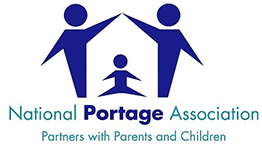Resources for Parents - Top Tips to Support Your Child's Development
Portage Top Tips: Teaching Your Child Using the Portage ‘Small Steps’ Approach – general tips and introduction to the Portage ‘Small Steps’ approach. This guide will support you to use all NPA ‘Top Tips’ documents and understand how the breaking down of activities and using the Portage model can support your child to develop new skills.
Cognitive Skills: Teaching Your Child to Count Out the Correct Quantity - activities to support developing an understanding of quantity.
Cognitive Skills: Teaching Your Child to Match Colours - activities to support your child to develop the skills to match.
Communincation and Language: Teaching Your Child to Realise Their Voice is Useful - fun games to play to help your child to learn that using their voice has an effect on other people.
Fine Motor Skills: Teaching Your Child to Develop a ‘Pincer Grasp’ - activities to support the development of fine hand skills which require a pincer grasp.
Fine Motor Skills: Teaching Your Child to Post/Release Objects - an important skill to learn before tackling more complex fine motor skills such as puzzles, shape sorters, threading, etc.
Fine Motor Skills: Teaching Your Child to Thread - an important skill that underlies a number of daily living tasks including being able to fasten and unfasten buttons.
Fine Motor Skills: Teaching Your Child to Use Scissors - lots of activities to develop the 'squeezing' action of the thumb and fingers that is required for using scissors.
Physical Development, Moving and Handling: Teaching Your Child to Sit – activities to support your child to develop the strength and skills needed for sitting.
Physical Development, Moving and Handling: Teaching Your Child to Crawl – activities to support your child to develop the strength and skills needed for crawling.
Physical Development and Self Care Skills: Teaching Your Child to Drink from an Open Cup – activities to support your child to develop the oral skills needed for drinking / feeding.
Physical Development and Self Care Skills: Teaching Your Child to Use a Spoon – activities to support your child to develop the fine motor skills needed to begin using a spoon.
Cognitive Development: Supporting Your Child to Focus on and Track Objects – activities to support the development of visual tracking skills, needed for most daily activities, coordination and physical control.
Communication and Language Skills: Supporting Your Child to Develop a Joint or Shared Attention - activities and strategies to help develop communication skills and important social skills; supporting your child’s interest in objects, the environment and people around them.
Communication and Language Skills: Supporting Your Child to Develop Early Reading Skills - activities to support the development of skills needed for literacy and early reading.




